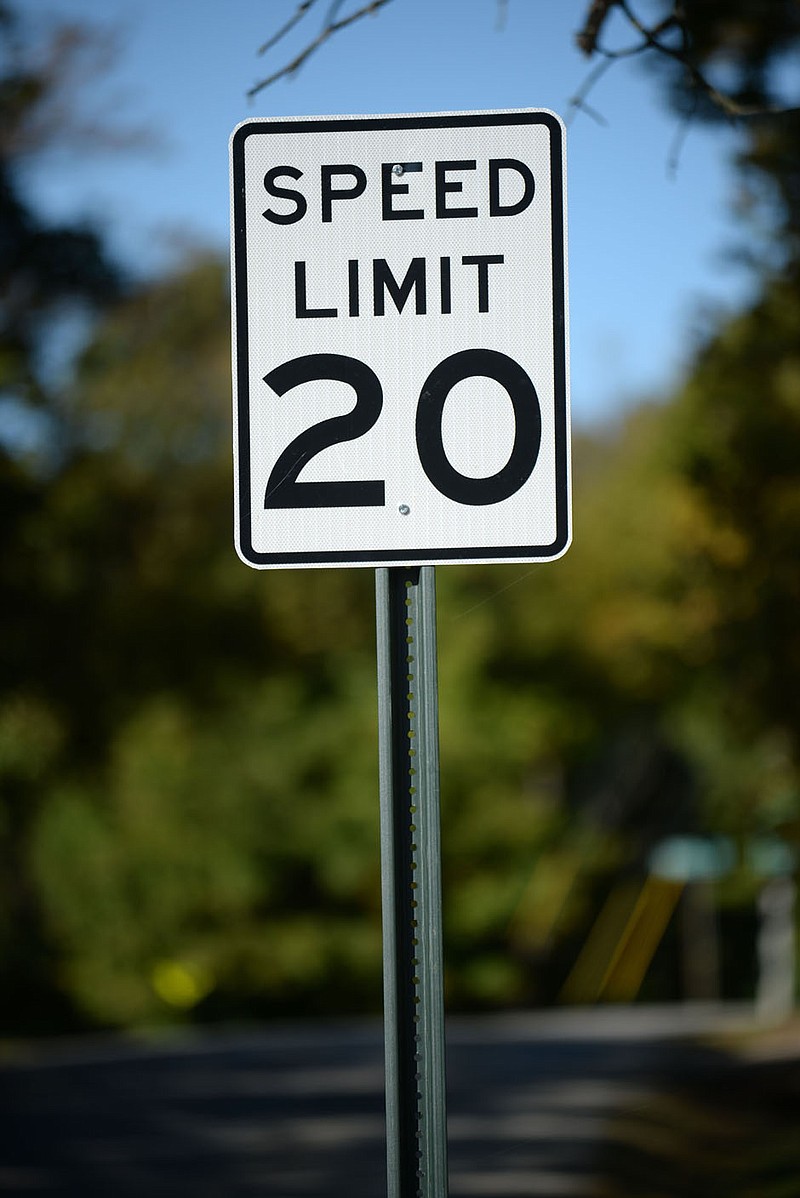FAYETTEVILLE -- The city is considering lowering the default speed limit in neighborhoods to 20 mph.
The rule now is 25 mph for any residential street that doesn't have a sign indicating a speed limit. It's 20 mph for a street in a business district without a sign, such as Dickson Street or the downtown square. A business district, per city code, includes any street with commercial uses fronting at least half of a distance of 300 feet or more.
The city's Transportation Committee, consisting of half the City Council, on Tuesday unanimously supported lowering the limit in neighborhoods. The move is a recommendation from the Active Transportation Advisory Committee, a resident panel that discusses issues related to pedestrian and bicycle travel in the city.
The 20 mph rule wouldn't apply to any street that already has a speed limit sign.
The city began experimenting with a 20 mph speed limit on streets near Wilson Park in October. Dane Eifling, the city's mobility coordinator, said he's not received any complaints.
The change would be easy to make -- all it would take is changing a few words in city code -- however, it would take outreach to tell residents about it, he said.
It also will take more than a speed limit change to slow drivers in neighborhoods, Eifling said. On-street parking, planters, bollards, reduced lane widths and painting different colors on the street all are methods the city has used.
Council member Sarah Bunch said drivers speeding through neighborhoods is one of the foremost complaints she receives from constituents.
Council member Sarah Marsh said she'd like to see one default speed limit on the city's books for both neighborhood and commercial streets with no sign posted.
A 2016 report from ProPublica, a national investigative journalism nonprofit group, shows the risk of death to a pedestrian depends on the speed of a car. The data show a person has a 7% chance of dying if hit by a car going 20 mph and a 12% chance of death if hit by a car going 25 mph. At 30 mph, the risk is 25%.
Brannon Pack, former executive director of Ozark Off-Road Cyclists, said more families are using their neighborhood streets as playgrounds because of the pandemic. Lowering the speed limit would create a safer and more inviting space in which to live, he said.
The move also would play into the city's larger goals, Pack said.
"I think Fayetteville's goal to connect its paved trail network to within a half-mile of its citizens is best in class," he said. "Lowering the residential speed limits should only help break down any perceived barriers a resident might have to ride or walk in their own neighborhood, which is necessary to access the trail network."
If adopted, drivers would get a 30-day grace period to adapt to the change, said Sgt. Anthony Murphy with the police department. Issuing a speeding ticket often is left to officer discretion, he said.
"It's got to be within reason," Murphy said. "Officers will definitely give leeway."
State law gives cities the power to pass traffic ordinances not in conflict with state law. There are certain provisions for setting the speed limit on state highways within cities, but otherwise, speed limits are left to local authorities, said Lanny Richmond, legal counsel with the Arkansas Municipal League.
The default speed limit in Springdale and Bentonville is 25 mph. In Rogers, it's 30 mph.
The measure is not intended to be an arbitrary rule, said Drew Wallis, chairman of the Active Transportation Committee. The idea is to hammer home the importance of driving slowly in neighborhoods, he said.
"It's more about knowledge and education about why," he said. "We wouldn't want there to be speed traps with cops pulling everybody over. We would much prefer they give someone a warning and say, 'Hey, the speed limit is like this because there are people walking around.'"
More News
The language
Fayetteville city code says:
Where no special hazard exists, the following speeds shall be lawful, but any speed in excess of such limits shall be prima facie evidence that the speed is not reasonable or prudent and that it is unlawful:
• 20 mph in any business district.
• 25 mph in any residential district.
Source: Fayetteville
Stacy Ryburn can be reached by email at sryburn@nwadg.com or on Twitter @stacyryburn.
